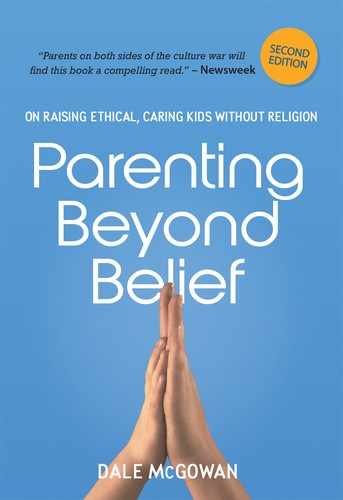GLOSSARY
These are terms mentioned in this book that are either especially important or so unimportant that few people will know their meaning.
AGNOSTIC: One who withholds judgment on the existence or nonexistence of supernatural entities on the grounds that it cannot be known with any certainty. Coined by 19th-century biologist Thomas Huxley.
ATHEIST: One who does not believe in the existence of a god or gods.
BAHA’I: A religion born in the mid-19th century as an offshoot of Babism (which was an offshoot of Shia Islam, which was an early division of original Islam). Has many admirable humanistic tenets, including equality of sexes, abolishing racial and religious prejudice, and universal education.
BRIGHTS: A recent attempt at a positive term for those whose worldview is naturalistic, without supernatural or mystical elements. Philosopher Daniel Dennett has suggested SUPERS as the corresponding name for those who believe in the supernatural.
CHRISTADELPHIANS: Also known as Brethren of Christ, this sect was founded by a British physician in 1848 around the need for a return to primitive Christianity. Doctrines include equal important of Old and New Testaments, conscientious opposition to war, and eternal life only for believers. Nonbelievers cease to exist.
EVANGELICAL: Any Christian denomination that stresses the personal, born-again conversion experience; holds the Bible in high authority; and considers it important to convert others to their beliefs.
EXISTENTIAL: Relating to questions of individual human existence. Questions about individual existence, mortality, life, death, freedom, and choice are all existential questions.
FREETHINKER: One who does not passively accept views or teachings, especially on religion, preferring to form opinions as a result of independent inquiry.
FUNDAMENTALISM: In current usage, refers to conservative Protestant Christian practice and beliefs, including the infallibility and literal interpretation of the Bible, salvation through faith alone, and damnation for nonbelievers.
HUMANISM: A concern with the well-being and interests of humanity as opposed to supernatural beings and ideas. Humanism most often includes the rejection of all supernatural beliefs, including belief in God. Sometimes “secular” precedes it to make clear that this more precise meaning is intended.
JAINISM: A religion originating in India around the same time as Buddhism, and, like Buddhism, essentially atheistic. Embraces nonviolence, education, and moral conduct.
METAPHYSICAL: Concerning the nature of ultimate reality and existence, including consideration of abstract concepts and intangible things.
MUGGLETONIANS: A small Protestant sect formed when an English tailor had a vision and “commissioning from God” in 1652. Focused on the imminent second coming of Christ. The last practicing Muggletonian died in 1979.
NONTHEIST: Generally synonymous with “atheist,” though some people prefer “nontheist” to indicate disbelief without implying active rejection. Others prefer it because “atheist” has been used as a hostile term by believers for so long. Many atheists find the label pusillanimous.
PENTECOSTALISM: A loosely affiliated fundamentalist Christian denomination emphasizing the imminent second coming of Christ and the personal, ecstatic experience of the Holy Spirit, often marked by speaking in tongues and uncontrollable bodily movements. Faith healing is also a common feature.
PROSELYTIZE: To actively attempt to convert another person to one’s own religious beliefs.
SEVENTH-DAY ADVENTISTS: A large Protestant denomination (10 million members worldwide) with principles that include the Bible as sole authority, the imminent return of Christ, living a healthy lifestyle, avoiding dancing and theaters, and worshipping on Saturdays (attending church on Sunday is called “the mark of the Beast”).
SKEPTIC: One who requires sufficient evidence before accepting a conclusion.
SUNDAY ASSEMBLY: A global movement of congregational meetings without religion, intended to encourage everyone to “live better, help often, and wonder more.”
SUPERS: Those who have a worldview including supernatural beliefs. Coined by Daniel Dennett. Opposed to BRIGHTS (see p. 285).
TRANSUBSTANTIATION: The Catholic doctrine that Communion bread and wine become, when consecrated, the actual body and blood of Jesus Christ.
UNITARIAN UNIVERSALISM: A religious denomination that attempts to capture many of the best features of religious communities without demanding a single belief or creed of its members. UU churches are creedless and nondogmatic. Most members and attenders are nontheistic.
